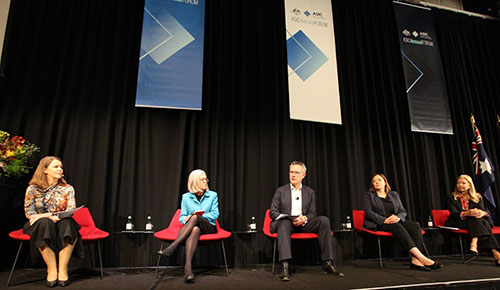This article follows a session on this topic held at the ASIC Annual Forum (AAF), 3-4 November 2022. Catch up on session highlights from the Forum.
The session was moderated by Ticky Fullerton, Business Editor at Large, The Australian.
Panel:
- Karen Chester, Deputy Chair, ASIC
- Patricia Cross, Chair, OFX, Independent Non-Executive Director, Transurban Limited, Board Member, Future Fund
- Dr Guy Debelle, Chief Financial Officer, Fortescue Future Industries
- Emma Herd, Partner, Climate Change and Sustainability Services, Ernst & Young

Key points
- This AAF session explored sustainable finance and how financial markets in Australia and around the world are responding to an increasing demand for sustainability-related products.
- Many entities are under pressure to make sustainability and climate-related disclosures and to demonstrate how their investment and corporate actions align with their claims.
- ASIC has identified sustainable finance as a key strategic priority, with a particular focus on deterring greenwashing. We are currently investigating a number of listed entities, super funds and managed funds in relation to their sustainability-related claims.
Sustainability-labelled investments have more than doubled between 2019–21 in our region alone, according to Morningstar Australia. As the market continues to grow and develop, transparency and trust are paramount to maintaining investor confidence.
Reducing the harms of greenwashing
As entities promote their sustainability and green practices, they risk overrepresenting the extent to which their products or investment strategies are environmentally friendly, sustainable or ethical. A practice known in the market as ‘greenwashing’.
ASIC has taken its first action for ‘greenwashing’ against listed energy company Tlou Energy Limited. ASIC warns entities promoting their sustainable and green practices as part of their value proposition that they must be able to support their sustainability-related claims.
In discussing ASIC’s approach to greenwashing ASIC Deputy Chair Karen Chester said,
‘You can’t overstate the economic costs of greenwashing. ASIC cannot be an island here which is why we work with our regulatory colleagues.’
Ms Chester talked about concerns in ‘the compounding lack of confidence that comes with greenwashing’.
For companies, ‘There is already a clear line in the sand. Disclosure has to be made on a reasonable basis. It can’t be purely aspirational’.
‘Now ASIC is at the compliance and enforcement stage with greenwashing, and we’ve got investigations underway to make sure we have a good message of deterrence’.
Greenwashing remains a priority for ASIC. ASIC continues to monitor the market and will take enforcement action where there are breaches.
Climate disclosure and governance
The governance and disclosure of sustainability and climate-related matters is a global priority.
Late last year the International Sustainability Standards Board (ISSB) was established and tasked with delivering a global baseline of sustainability and climate-related disclosures for capital markets.
While international developments on climate related disclosure standards are moving at pace, ASIC is actively engaged and supports the work of the ISSB.
Ms Chester spoke about ASIC’s continuing focus on supporting effective climate and sustainability governance and disclosure practices.
‘The biggest risk is investors don’t have good quality, comparable information to get capital calls right. The price of capital will be too high if we have fragmented standards.’
ASIC continues to encourage directors and senior management of listed companies to voluntarily report under the Taskforce on Climate-related Financial Disclosures (TCFD) framework. ‘We need to be doing global best practice here in Australia’, Ms Chester said. ‘And with the progress being made on international standards we need to move apace here now.’
ASIC is Australia’s corporate, markets and financial services regulator.